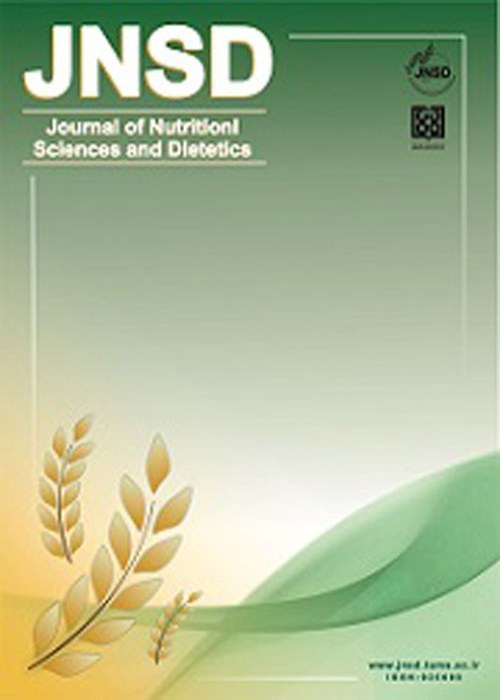The potential role of quercetin supplementation in modulating glucocorticoid-induced hyperglycemia
Author(s):
Abstract:
Dear editor, Glucocorticoid are a large class of drugs that have anti-inflammatory and immunosuppressive properties and remain a necessary component of treatment for many disease (1). Despite their therapeutic effect, corticosteroids have several side effects which onset and progress in hyperglycemia in non-diabetic patient and exacerbate hyperglycemia in patients with diabetes is one of them (2), Glucocorticoids also lead to increase insulin resistance in all patients (3). The major mechanism which cause glucose intolerance after administration of glucocorticoids, is reduction in insulin sensitivity (4). Glucocorticoids impair glucose use through post receptor defects, such as diminished GLUT4 expression and migration and decreased glycogen synthesis through reduction of glycogen synthase activity (5). Moreover, glucocorticoids enhance hepatic gluconeogenesis by increase phosphoenolpyruvate carboxykinase and glucose-6-phosphatase activity (6). Furthermore, mRNA expression of the AMP-activated protein kinase (AMPK) is correlated negatively with mRNA expression of the glucocorticoids which AMPK can reduce blood glucose level by reduction of glucose production in the liver (7). In addition, Glucocorticoids inhibit production and secretion of insulin by pancreatic β cells (8). This hyperglycemia is associated with endothelial dysfunction and cardiovascular disease (9).
Currently, blood glucose lowering agents in diabetic patients including sulfonylureas, metformin, thiazolidinediones (TZDs) and insulin are the only option for treatment of these patient (10). These agents have many complications such as hypoglycemia, lactic acidosis and increase in risk of bone fracture (11, 12). Previous studies suggested that some bioflavonoids such as quercetin could be beneficial in controlling blood glucose (13).
Quercetin is one of the most abundant flavonols, which is found in some sources such as tea, onion and apple. This flavonol has many features such as antioxidant, dyslipidemia improving, endothelial function- improving, Antihyperglycemic effection and so on (14-17). Antihyperglycemia mechanism of quercetin involves its effects on GLUT4 transposition from cytoplasm to cell membrane through upregulation the level of AS160 phosphorylation (18). Moreover, this flavonoid protected pancreatic β cells from oxidative stress resulting in increased insulin secretion(19). quercetin could also inhibit intestinal α-glucosidase activity and decrease postprandial hyperglycemia (20). Furthermore, quercetin is an AMPK activator and affects energy metabolism and blood glucose levels (18).
Taken together, this evidence show quercetin could potentially be alternative hypoglycemic agent without side effects in this patients. Given the fact that so far no study has been done on this issue, this can be the subject of future studies.
Currently, blood glucose lowering agents in diabetic patients including sulfonylureas, metformin, thiazolidinediones (TZDs) and insulin are the only option for treatment of these patient (10). These agents have many complications such as hypoglycemia, lactic acidosis and increase in risk of bone fracture (11, 12). Previous studies suggested that some bioflavonoids such as quercetin could be beneficial in controlling blood glucose (13).
Quercetin is one of the most abundant flavonols, which is found in some sources such as tea, onion and apple. This flavonol has many features such as antioxidant, dyslipidemia improving, endothelial function- improving, Antihyperglycemic effection and so on (14-17). Antihyperglycemia mechanism of quercetin involves its effects on GLUT4 transposition from cytoplasm to cell membrane through upregulation the level of AS160 phosphorylation (18). Moreover, this flavonoid protected pancreatic β cells from oxidative stress resulting in increased insulin secretion(19). quercetin could also inhibit intestinal α-glucosidase activity and decrease postprandial hyperglycemia (20). Furthermore, quercetin is an AMPK activator and affects energy metabolism and blood glucose levels (18).
Taken together, this evidence show quercetin could potentially be alternative hypoglycemic agent without side effects in this patients. Given the fact that so far no study has been done on this issue, this can be the subject of future studies.
Keywords:
Language:
English
Published:
Journal of Nutritional Sciences and Dietetics, Volume:2 Issue: 4, Autumn 2016
Page:
7
magiran.com/p1742876
دانلود و مطالعه متن این مقاله با یکی از روشهای زیر امکان پذیر است:
اشتراک شخصی
با عضویت و پرداخت آنلاین حق اشتراک یکساله به مبلغ 1,390,000ريال میتوانید 70 عنوان مطلب دانلود کنید!
اشتراک سازمانی
به کتابخانه دانشگاه یا محل کار خود پیشنهاد کنید تا اشتراک سازمانی این پایگاه را برای دسترسی نامحدود همه کاربران به متن مطالب تهیه نمایند!
توجه!
- حق عضویت دریافتی صرف حمایت از نشریات عضو و نگهداری، تکمیل و توسعه مگیران میشود.
- پرداخت حق اشتراک و دانلود مقالات اجازه بازنشر آن در سایر رسانههای چاپی و دیجیتال را به کاربر نمیدهد.
In order to view content subscription is required
Personal subscription
Subscribe magiran.com for 70 € euros via PayPal and download 70 articles during a year.
Organization subscription
Please contact us to subscribe your university or library for unlimited access!


